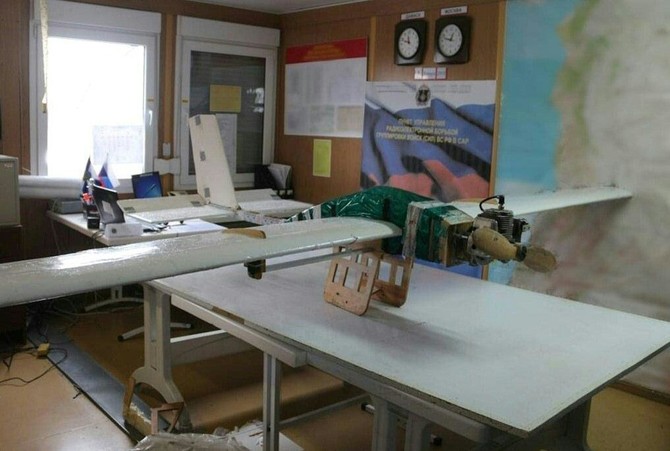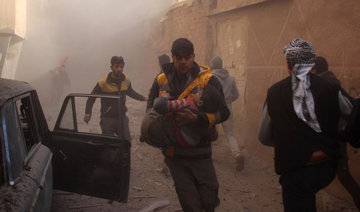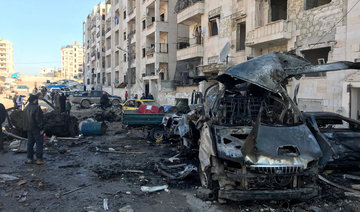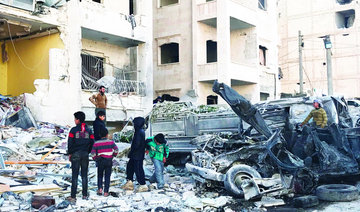MOSCOW: Russia said Tuesday that a recent series of drone attacks on its military bases in Syria would have required assistance from a country possessing satellite navigation technology — a statement that appeared to be aimed at the United States.
Russia’s Defense Ministry said its forces repelled a series of drone attacks Saturday on the Hemeimeem air base and a naval facility in Tartus, adding that out of the 13 drones involved, seven were shot down and six were forced to land without inflicting any damage.
Without blaming any specific country, the ministry said data for the attacks could only have been obtained “from one of the countries that possesses know-how in satellite navigation.”
In Tuesday’s statement, it noted a “strange coincidence” of a US military intelligence plane flying over the Mediterranean near the two Russian bases at the moment of the attack.
The US and Russia support opposing sides of the Syrian civil war.
Russian President Vladimir Putin declared victory in Syria last month and ordered a partial troops pullout, and the Kremlin said late Monday that the number of Russian troops left in Syria is sufficient for fending off any attacks by militants.
Asked Tuesday whether the withdrawal could have been premature in view of the drone attack, Putin’s spokesman Dmitry Peskov said the Russian forces in Syria have “all the necessary means” to counter any challenge.
Syria’s president Bashar Assad has recovered major territory in the country in the past two years, largely because of Russia’s military support. His forces are currently battling on two fronts, in the northwestern Idlib province and in the eastern suburbs of Damascus.
Opposition activists have reported airstrikes and shelling of rebel-held Damascus suburbs that killed and wounded dozens. The Britain-based Syrian Observatory for Human Rights said warplanes attacked several suburbs of Damascus, including Saqba, where a man and a child were killed and 13 others were wounded.
AFP reported Tuesday evening that 24 are dead in raids on the Gouta district, just outside of Damascus, including 10 children.
The Observatory and the Syrian Civil Defense, first responders known as the White Helmets, reported airstrikes on other suburbs, including Harasta and Douma.
Syria’s state news agency SANA said shelling of the capital Tuesday killed five people and wounded 30. SANA said 15 shells struck the central, predominantly Christian neighborhood of Bab Touma. The capital has been shelled on a near-daily basis in recent weeks.
Turkey’s foreign minister accused Syrian government forces of attacking moderate opposition fighters under the guise of fighting extremists.
Mevlut Cavusoglu’s comments came a day after Syrian government forces captured 14 villages as they advanced on Idlib, the largest rebel-held enclave in the country’s north, amid a wave of airstrikes. The troops aim to reach a rebel-held air base and secure the road linking the capital, Damascus, with the northern city of Aleppo, Syria’s largest.
The government offensive around Idlib has forced thousands of civilians to flee toward the border with Turkey.
Cavusoglu said Syrian government attacks on moderate opposition forces would “axe” peace efforts.
Turkey, which backs the opposition, and Russia and Iran, whose wide-ranging support for Assad has turned the war in his favor, have taken the lead in Syria peace efforts over the past year.
The UN humanitarian chief arrived in Damascus Tuesday to assess the humanitarian situation and discuss with government officials ways of improving access and aid delivery.
Mark Lowcock’s visit is the first by the head of the UN’s humanitarian agency since December 2015. The UN estimates that more than 13 million people need basic aid and protection across Syria. Lowcock is expected to meet government officials and visit the central city of Homs during his three-day visit.
Russia takes aim at US over series of Syria drone attacks
Russia takes aim at US over series of Syria drone attacks

UN warns nearly a fifth of world’s children affected by war

- Numbers at their highest since Second World War, almost doubled since 1990
- Gaza, Sudan among worst affected, more children expected to be casualties in Ukraine as toll continues to rise
LONDON: The UN has warned that nearly one in five children around the world live in areas affected by war. The global body’s children’s agency UNICEF has said 473 million children face the worst violence seen since the Second World War, with the number having almost doubled since 1990.
The UN said it had identified a record 32,990 grave violations against 22,557 children, the highest number on record. It added that around 44 percent of the nearly 45,000 victims of Israel’s war in Gaza were children, whilst there had been more child casualties in the war in Ukraine in the first nine months of 2024 than in the entirety of the previous year.
“By almost every measure, 2024 has been one of the worst years on record for children in conflict in UNICEF’s history, both in terms of the number of children affected and the level of impact on their lives,” said UNICEF’s Executive Director Catherine Russell.
“A child growing up in a conflict zone is far more likely to be out of school, malnourished, or forced from their home — too often repeatedly — compared with a child living in places of peace.
“This must not be the new normal. We cannot allow a generation of children to become collateral damage to the world’s unchecked wars.”
UNICEF added that there had been a significant increase in sexual violence toward young women and girls, and highlighted an explosion of reports in Haiti where rape and sexual assault cases increased 1,000 percent in 2024.
Malnutrition, too, is a major cause of trauma for children in conflict zones, with UNICEF focusing in particular on its effects in Sudan and Gaza. Around half a million people in five conflict-affected countries, it added, are affected by famine.
Gaza is also the center of a crisis regarding access to healthcare, with a polio outbreak detected in July this year. The UN responded with a mass vaccine campaign, which has so far reached 90 percent of the enclave’s children despite the hazardous conditions. But beyond Gaza, the UN said, 40 percent of the world’s unvaccinated children live in or near conflict zones.
UNICEF added that over 52 million children lack access to education, with Gaza and Sudan again at the forefront of this crisis.
Ukraine, the Democratic Republic of the Congo, and Syria have also seen swathes of their education infrastructure destroyed. The charity War Child, meanwhile, reported earlier in December that 96 percent of children in Gaza believe death is imminent, with almost half describing trauma that made them feel dying would be desirable.
“Children in war zones face a daily struggle for survival that deprives them of a childhood,” Russell said. “Their schools are bombed, homes destroyed, and families torn apart. They lose not only their safety and access to basic life-sustaining necessities, but also their chance to play, to learn, and to simply be children. The world is failing these children. As we look towards 2025, we must do more to turn the tide and save and improve the lives of children.”
Afghan Taliban hit several locations in Pakistan in ‘retaliation’ for attacks

- Pakistani air raids on southeastern Afghanistan killed at least 46 people on Tuesday
- Pakistan’s attacks took place as Islamabad’s special envoy visited Kabul for talks to strengthen ties
KABUL: Afghan Taliban forces targeted several locations in Pakistan on Saturday, Afghanistan’s defense ministry said, days after the Pakistani military launched deadly air raids on its territory in the latest flare-up of tensions.
The Pakistani Air Force bombed Afghanistan’s southeastern Paktika province on Tuesday, claiming it was targeting alleged hideouts of the Tehreek-e-Taliban Pakistan — the Pakistani Taliban — a militant group separate from the Afghan Taliban.
The raids killed at least 46 people, most of whom were children and women, the Afghan Ministry of National Defense said after the attack.
Announcing Saturday’s strikes, the ministry said in a statement that “several points beyond the assumptive lines ... were targeted in retaliation.”
While the statement did not mention Pakistan, the “assumptive lines” is a reference to the Afghan-Pakistani border, part of the Durand Line — a colonial-era boundary dividing the regions and communities between Afghanistan and what is now Pakistan. The boundary has never been officially recognized by any Afghan government.
Citing ministry sources, local media reported that 19 Pakistani soldiers were killed in the clashes. There was no official comment from Pakistan, but a security source confirmed that the confrontation with Afghan forces took place.
Since the Taliban took control of Afghanistan in 2021, Pakistan has repeatedly accused them of allowing TTP militants to use Afghan territory for cross-border attacks — a claim the Taliban have denied.
The latest escalation of hostilities comes as TTP fighters last week claimed responsibility for killing 16 Pakistani soldiers in the border region of South Waziristan. The area targeted by Pakistani strikes days later was the nearby Barmal district on the Afghan side of the border.
“Pakistan claims that by targeting alleged TTP hideouts and training venues in Barmal district in southeast of Afghanistan, it ensures security inside the country. This means that by challenging the security of its neighbors, Pakistan is trying to strengthen its own security,” Abdul Saboor Mubariz, board member of the Center for Strategic and Regional Studies in Kabul, told Arab News.
The Pakistani attack took place on the same day that Islamabad’s special representative for Afghanistan, Mohammad Sadiq, was in Kabul for talks to strengthen bilateral ties.
“A major problem that exists in Pakistan’s politics is that the civil government is not aligned with the military ... The civil government is backing negotiations, while the army is after a military solution,” Mubariz said.
“TTP has been a major barrier in relations between Pakistan and Afghanistan ... the Taliban, however, have continuously shown willingness for talks.”
Abdul Sayed, a Sweden-based analyst and expert on the politics and security of the Afghanistan-Pakistan region, interpreted Pakistan’s attack just hours after the Islamabad envoy’s visit as a “strategic message from Pakistan’s military establishment, signaling that failure to meet their demands through dialogue may result in the application of force.”
The subsequent responses from Taliban officials and Saturday’s retaliation by Taliban forces “appear to underscore their resolve not to yield to such pressure,” Sayed told Arab News.
“The Taliban’s stance suggests a commitment to defending Afghanistan’s territorial sovereignty and an unwillingness to capitulate under the threat of force. This approach of employing force is unlikely to yield a sustainable resolution; instead, it risks exacerbating security challenges for both states, particularly Pakistan, while further destabilizing the broader regional security landscape.”
Several airlines cancel flights to Russia after Azerbaijan Airlines crash

- Turkmenistan Airlines was the latest airline to announce cancelations Saturday
- Kazakhstan’s Qazaq Air has suspended its flights to Yekaterinburg until the end of January
MOSCOW: Several airlines have announced the suspension of flights to Russian cities, after Western experts and the US suggested the crash of the Azerbaijan Airlines this week may have been caused by a Russian anti-aircraft missile.
Moscow has declined to comment on reports the plane could have been accidentally shot down by its air defense.
Russia has said that Grozny, the Chechen capital where the plane was meant to land, was being attacked by Ukrainian drones that day.
It crashed near the Kazakh city of Aktau Wednesday, killing 38 of the 67 people on board.
Turkmenistan Airlines — the national carrier of the reclusive Central Asian state — was the latest airline to announce cancelations Saturday.
It said that “regular flights between Ashgabat-Moscow-Ashgabat were canceled from 30/12/2024 to 31/01/2025,” without giving an explanation.
The decision came after UAE airline flydubai suspended flights between Dubai and the southern Russian cities of Mineralnye Vody and Sochi that were scheduled between December 27 and January 3.
Kazakhstan’s Qazaq Air has suspended its flights to Russia’s Urals city of Yekaterinburg until the end of January.
Earlier this week, Israeli airline El Al said it was suspending its flights to Moscow for a week.
The Azerbaijan Airlines Embraer 190 crashed near the western Kazakh city of Aktau, on the shores of the Caspian Sea.
It was carrying out a flight between Azerbaijan’s capital Baku and the city of Grozny in Russia.
For several days, some Western experts have been pointing to a crash caused by a Russian anti-aircraft missile.
Citing preliminary results of an investigation, Azerbaijan’s transport minister said Friday that the crash suffered physical “external interference.”
Statements from Azerbaijan citing the investigation into the incident suggest Baku believes the plane was hit mid-air.
On Friday, White House spokesman John Kirby said Washington has “indications” Russia may have been responsible, without giving details.
Cyber attack on Italy’s Foreign Ministry, airports claimed by pro-Russian hacker group

- The pro-Russian hacker group Noname057(16) claimed the cyberattack on Telegram
MILAN: Hackers targeted around ten official websites in Italy on Saturday, including the websites of the Foreign Ministry and Milan’s two airports, putting them out of action temporarily, the country’s cybersecurity agency said.
The pro-Russian hacker group Noname057(16) claimed the cyberattack on Telegram, saying Italy’s “Russophobes get a well deserved cyber response.”
A spokesperson for Italy’s cybersecurity agency said it was plausible that the so-called “Distributed Denial of Service” (DDoS) attack could be linked to the pro-Russian group.
In such attacks, hackers attempt to flood a network with unusually high volumes of data traffic in order to paralyze it.
The spokesperson said the agency provided quick assistance to the institutions and firms targeted and that the attack’s impact was “mitigated” in less than two hours.
The cyberattack has not caused any disruptions to flights at Milan’s Linate and Malpensa airports, a spokesperson for SEA, the company which manages them, said.
While the websites were inaccessible, the airports’ mobile apps continued to function, the SEA spokesperson added.
Finland moves tanker suspected of undersea cable damage closer to port

- BBaltic Sea nations have been on high alert after a string of outages of power cables, telecom links and gas pipelines since Russia invaded Ukraine in 2022
OSLO: Finnish authorities said on Saturday they are moving an impounded tanker closer to port after boarding the vessel carrying Russian oil earlier this week on suspicion it had damaged an undersea power line and four telecoms cables.
Baltic Sea nations have been on high alert after a string of outages of power cables, telecom links and gas pipelines since Russia invaded Ukraine in 2022, and NATO said on Friday it would boost its presence in the region.
The Cook Islands-registered ship, named by authorities as the Eagle S, was boarded on Thursday by a Finnish coast guard crew that took command and sailed the vessel to Finnish waters, a coast guard official said.
Finnish police believe the Eagle S may have caused the damage to undersea cables the previous day by dragging its anchor along the seabed.
“The police begin an operation to transfer the Eagle S tanker from the Gulf of Finland to Svartbeck, an inner anchorage near the port of Kilpilahti,” the Helsinki police department said in a statement on Saturday.
This would be a better place to carry out investigations, it added.
Finland’s customs service believes the ship is part of a “shadow fleet” of aging tankers being used to evade sanctions on the sale of Russian oil.
The Kremlin said on Friday Finland’s seizure of the ship was of little concern to it. In the past, Russia has denied involvement in any of the Baltic infrastructure incidents.






















